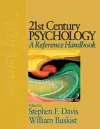
21st Century Psychology: A Reference Handbook
2 contributors - Set / collection
£324.00 was £360.00
Stephen F. Davis is Emeritus Professor of Psychology at Emporia State University. He served as the 2002-2003 Knapp Distinguished Professor of Arts and Sciences at the University of San Diego. Currently, he is Distinguished Guest Professor at Morningside College and Visiting Distinguished Professor of Psychology at Texas Wesleyan University. Since 1966, he has published over 325 articles, 30 textbooks, and presented over 900 professional papers; the vast majority of these publications and presentations include student coauthors. He has served as president of the Society for the Teaching of Psychology (STP; Division 2 of the American Psychological Association [APA]), Southern Society for Philosophy and Psychology, Southwestern Psychological Association, and Psi Chi. In addition, he received the first Psi Chi Florence L. Denmark Faculty Advisor Award. He is a fellow of APA Divisions 1 (General), 2 (STP), 3 (Experimental), and 6 (Behavioral Neuroscience and Comparative Psychology), and a recipient in 1988 of the American Psychological Foundation′s (APF) Distinguished Teaching of Psychology Award. William Buskist is the Distinguished Professor in the Teaching of Psychology at Auburn University and a Faculty Fellow at Auburn’s Biggio Center for the Enhancement of Teaching and Learning. He has published widely on issues related to teaching and learning, both within his own discipline of psychology and more generally in higher education. His most recent publications include edited works with Groccia (Evidence-Based Teaching) and with Victor Benassi (Effective College and University Teaching: Strategies and Tactics for the New Professoriate). He has served as President for the Society for the Teaching of Psychology and is currently the Editor-in Chief for the Society’s e-book program). He has won numerous teaching awards at both the local and national levels as have many of his graduate student protégés. He is a Fellow of both the American Psychological Association and the Association for Psychological Science.